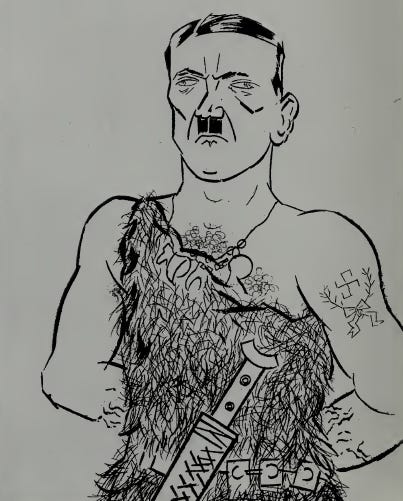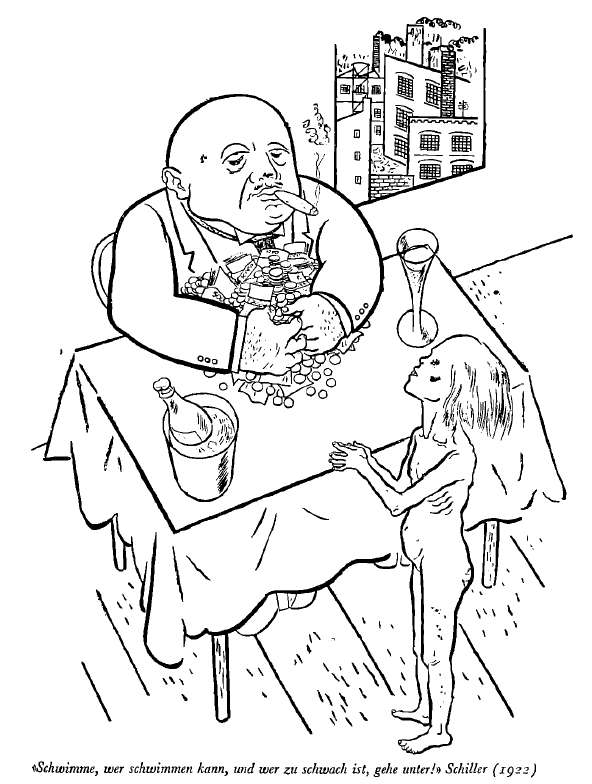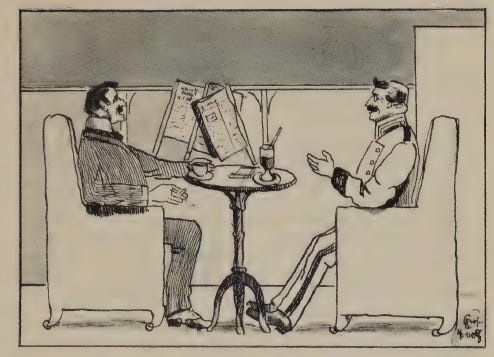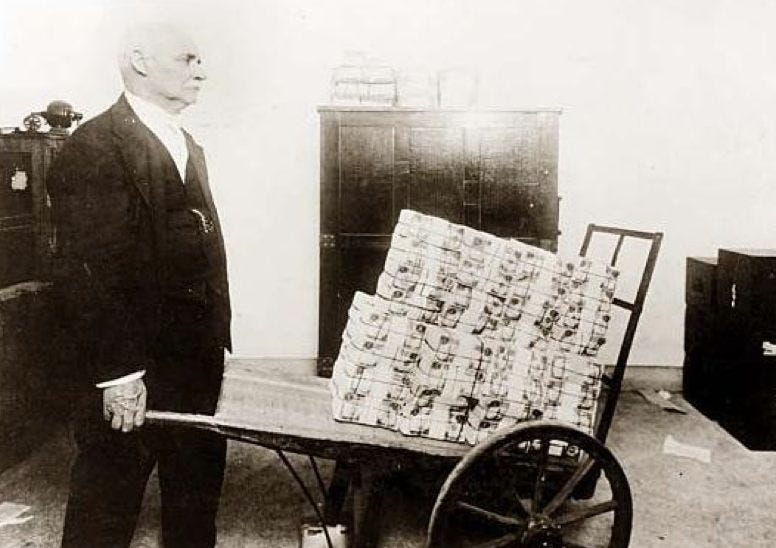Before the Deluge, Part 1
A Kind of Madness
Otto Friedrich’s portrait of Berlin in the 1920’s.
“I have read a variety of cultural, sociological, and historical books and memoirs about the [Weimar] period over the years…
But none of the books I’ve mentioned regarding Weimar — and none that I can recall on other historical periods — comes close to the dazzling encapsulation and evocation of this complex era Otto Friedrich achieves in Before the Deluge. Published originally in 1972 and revised in 1995 just before his too-early death, this elegant exploration combines scholarship (he consulted over three hundred books) and interviews — and in the early seventies, a lot of eyewitnesses were still around, and the trenchant observations and rueful critiques they provide here are a testament to the long-time journalist’s manner and skill…
The book’s seventeen chapters, aside from its first scene-setting prologue chapter, each depict a year in Berlin under the Weimar Republic from 1918 to 1933. Throughout, Friedrich presents clean, concise summations of big events and big ideas, never losing sight of how they affected real people…
We all know where this is going to end up, yet we linger idyllically at summer picnics, we watch the glamorous Dietrich coming into her own, we watch the machinations of the military and the president and the Communists and the Social Democrats. And we slowly, ever so slowly, out of the corner of our eye, become aware of the actions of Hitler and his ragtag Nazis. They are a blip in the narrative in the early chapters, a merest mention — just as they must have seemed at the time. Until by the last chapters, the Nazi party is front and center in the narrative, overwhelming the last bastions of rationality. After Hitler is installed as chancellor, Friedrich quickly empties his stage, noting: “And so the exodus began.”
You can draw parallels between any two periods of history and find commonalities. Of course: the common denominator is us, people, flawed humans flawless in our blind obtuseness. And you can detect the seeds of destruction — or more optimistically — the progenitors of progress in any past event. We tell stories, we look for explanations, we see what we want to see, we cherry pick, we bend truth to our own ends…
“If I could choose a time to live in, any time, any place, I’d choose the 1920's, in Berlin.”
Rabbi Joachim Prinz (interviewed decades later)
“If today, thinking it over calmly, we wonder why Europe went to war in 1914, there is not one sensible reason to be found, nor even any real occasion for the war. There were no ideas involved, it was not really about drawing minor borderlines; I can explain it only - thinking of that excess of power - by seeing it as a tragic consequence of the internal dynamism that had built up during those forty years of peace, and now demanded release.”
Stefan Zweig, The World of Yesterday
My purpose here (other than to provide myself with a reference) is to highlight passages of Friedrich’s book that jumped out at me. In the many passages from the many books I have read over the years on the Weimar era, I am always most interested in how major events affect the populace at large, not the elites.
Obviously I am skipping 95% of the book, but hopefully this will give you an idea of the forces moving and shaping post-World War I Germany. I could not find any digital version of the book, so I used an app to photograph pages from my hardcover copy and convert them to text. Any errors, as usual, are probably mine. - RH
1918
“It is profoundly difficult, as we have learned in recent years, for a nation to accept the fact that a war cannot be won, and that all those who died, died in vain.”
“I…cry out to the mourners: he died for nothing,” wrote Kurt Tucholsky, the brilliantly caustic social commentator in Berlin, “for madness, for nothing, for nothing, for nothing.”
The generals, who were responsible, subsequently preferred to blame their loss on defeatism and sabotage at home, on those amorphous forces that they blamed for what they liked to call “the stab in the back,” the forces that Adolf Hitler later took to denouncing as “the November criminals.” And to many Germans, any accusation seemed plausible because the defeat itself was so shattering, so sudden, and so inexplicable.
“these were times of disintegration, when a revolt succeeds not because of its own strength but because of the weakness, the loss of nerve, of the ruling authorities”
It is not certain to this day who actually decided to attempt a suicidal break through that blockade —Prince Max, the Imperial Chancellor, was not even informed but on October 28, the order came from Berlin to steam out into the North Sea for one last grand battle with the British Navy.
In Kiel, Admiral Franz von Hipper promptly passed the order along to his men, and the men just as promptly refused to obey. In the boiler rooms of the battleships Thiiringen and Helgoland, stokers quenched the fires by turning hoses on them. The mutinous sailors started by singing revolutionary songs, then raised the red flag of revolt over their idled ships, and finally marched into Kiel and seized control of the city.
In ordinary times, the mutiny would not have lasted much more than a day, but these were times of disintegration, when a revolt succeeds not because of its own strength but because of the weakness, the loss of nerve, of the ruling authorities.In four years of war, the Kaiser’s Reich had rotted so badly that the sailors’ ill-organized uprising spread without resistance to the rest of the North Sea ports, and within a week, to Berlin.
Hitler: “I, for my part, decided to go into politics.”
General Groéner was not alone in his defense of the old system, and the bitterness of the professional officers was mild compared to that of the officers who were now being demobilized. At a military rally in the Berlin Philharmonic Hall during that first postwar month, a government spokesman pleaded for support of the new Republic, but a twenty-five-year-old air force captain named Hermann Goering rose to protest.
Climbing to the platform in his full uniform, decorated with silver epaulets and Germany’s highest medal, Pour le Mérite, the former commander of the Richthofen Squadron declared: “We officers did our duty for four long years…and we risked our bodies for the Fatherland. Now we come home—and how do they treat us? They spit on us...And therefore I implore you to cherish hatred—a profound, abiding hatred of those animals who have outraged the German people…But the day will come when we will drive them out of our Germany.”
One man who had already dedicated himself to that hatred had only been a corporal, but he felt presentiments of higher things. Adolf Hitler, then twenty-nine, half-blinded during a gas attack, was confined to a hospital in Pasewalk, eighty miles north of Berlin, when a pastor told him of “the greatest villainy of the century,” the Revolution and armistice. “Everything went black before my eyes,” Hitler later wrote in Mein Kampf1.
“I tottered and groped my way back to the dormitory, threw myself on my bunk and dug my burning head into my blanket and pillow…So it had all been in vain. In vain all the sacrifices…in vain…the death of two millions…There followed terrible days and even worse nights…In these nights hatred grew in me, hatred for those responsible for this deed. In the days that followed, my own fate became known to me….I, for my part, decided to go into politics.”
1919
‘There are twenty million Germans too many.’
BERLIN IN THE WINTER is never a very cheerful place. The sky hangs gray and low over the city for days on end, and the stone buildings that line the broad boulevards look massively bleak and forbidding. As the new year of 1919 began, the people of the defeated city, swarming with embittered ex-soldiers and refugees from the east, knew every form of cold and hunger and misery. An epidemic of influenza killed thousands; more than seventeen hundred died in a single day. And the armistice was not a peace. While the Allied diplomats in Paris conjured over their terms for a settlement, the Allied navies continued to blockade the German coast.
“Germany lay prostrate,” wrote Count Kessler. “France gave open vent to her desire for our extermination, expressing it monumentally in her Prime Minister’s words: ‘There are twenty million Germans too many.’ The continuation of the blockade after the armistice was rapidly fulfilling this wish; within six months from the armistice it had achieved a casualty list of 700,000 children, old people and women…
The German people, starved and dying by the hundred thousand, were reeling deliriously between blank despair, frenzied revelry, and revolution. Berlin had become a nightmare, a carnival of jazz bands and rattling machine guns…On the very day [of one battle in the center of the city] the streets were placarded with a poster ‘Who has the prettiest legs in Berlin? Visit the Caviare-flapper dance at such and such a cabaret at 8:30 P.M.’ Profiteers and their girls, the scum and riffraff of half Europe—types preserved like flies in amber in the caricatures of George Grosz—could be seen growing fat and sleek and flaunting their new cars and ostentatious jewelry in the faces of the pale children and starving women shivering in their rags before the empty bakers’ and butchers’ shops.”
George Grosz himself had enlisted in the army during what he later called “the mass intoxication” of 1914, but he had soon found the war to be a matter of “filth, lice, idiocy, disease, and deformity.” Discharged for what was then called “brain fever,” he returned to “dark, gloomy” Berlin and started to set down on paper the horrors that he had seen. Recalled to service again in 1917, he went into a kind of amnesic fit. “One night, I was found semiconscious, partially buried in a dung pit,” he said later. “I was regarded as a deserter and was told that I was to be shot.” Count Kessler knew of the young artist, however, and got him transferred to a mental institution until he could return to Berlin and resume his work.
“My drawings expressed my despair, hate and disillusionment,” Grosz said. “I drew drunkards; puking men; men with clenched fists cursing at the moon…I drew a man, face filled with fright, washing blood from his hands…I drew lonely little men fleeing madly through empty streets. I drew a cross-section of a tenement house: through one window could be seen a man attacking his wife; through another, two people making love; from a third hung a suicide with body covered by swarming flies. I drew soldiers without noses; war cripples with crustacean-like steel arms; two medical soldiers putting a violent infantryman into a strait-jacket made of a horse blanket...I drew a skeleton dressed as a recruit being examined for military duty, I also wrote poetry...”
“The hour has struck for the weighty settlement of our account.”
Brockdorff-Rantzau was a professional diplomat, a thin, bloodless Prussian with a monocle, and the French gave him a reception that must have filled him with dread. They forced his special train, loaded with 180 diplomats and experts all preparing to argue the German case, to creep along at ten miles an hour so that the Germans could get an impressive view of the devastated countryside of northern France. In Versailles itself, the French led the Germans to an isolated hotel, surrounded by barbed wire, and told them to carry their own baggage upstairs. Only after a week of confinement in the hotel was Brockdorff-Rantzau finally summoned to the Hall of Mirrors, where French Premier Georges Clemenceau welcomed him by announcing, “The hour has struck for the weighty settlement of our account.” There were to be no negotiations; the Germans were simply to receive the terms that the Allies had agreed on.
The terms were stunning. France was to get Alsace-Lorraine outright, she would occupy all German territory west of the Rhine for fifteen years, and she would take possession of the rich coal mines of the Saar district, which was to be governed by the League of Nations. Poland would get the important industrial region of Upper Silesia, most of Posen province, and West Prussia (thus establishing a Polish “corridor” to the sea and cutting off East Prussia from the rest of Germany). Denmark and Belgium would slice off several border regions, and the League would take charge of Germany’s African colonies. And disarmament would apply to Germany alone. Her military forces would be cut to 100,000 long-term volunteers, her General Staff would be abolished, and, since the army was to be purely for internal use, Germany would be forbidden to possess any warplanes, tanks, or armored cars.
The Weimar Republic would have to admit formally that it was responsible for “causing all the loss and damage to which the [Allies] have been subjected as a consequence of the war imposed on them by the aggression of Germany. A Reparations Commission would be established to assess the amount Germany must pay (preliminary estimates ran as high as $120 billion). And finally, Kaiser Wilhelm and all other “war criminals” would have to be turned over for prosecution by the Allies.
Brockdorff-Rantzau made a futile effort to submit German counterproposals and then brought the peace treaty back to Berlin. He recommended that it be rejected. With all parties uniting to halloo2 their opposition to the treaty. Chancellor Scheidemann not only rejected it but resigned, crying out in the Reichstag, “What hand would not wither that binds itself and us in these fetters?”
The Allies were not greatly concerned about German protests, however. Their answer was simple. Either the German government would sign the treaty or the Allied armies would invade Germany. In fact, the Allies gave the Germans exactly one week - until 7 P.M. on June 23 - to comply.
1920
“the incredible fact is that Imperial Germany’s conservative finance officials never levied a single mark in extra taxes to pay the gigantic costs of World War I.”
If anything could have made Matthias Erzberger more hated than his signing of the armistice, it was his energetic imposition of new taxes to rescue the Republic from bankruptcy. Now that we have become accustomed to paying a large share of our in. comes to support a permanent war economy, it seems hard to believe that wars were ever financed in other ways, but the incredible fact is that Imperial Germany’s conservative finance officials never levied a single mark in extra taxes to pay the gigantic costs of World War I.
The total cost had been 164 billion marks (the mark was then worth 4.20 to the dollar). Of this, 93 billion had been raised by war loans, and 29 billion by Treasury bills. The government had produced the rest simply by printing more money on the government printing presses. (The other great powers were scarcely more prudent. “Lenin is said to have declared that the best way to destroy the Capitalist System was to debauch its currency,” John Maynard Keynes observed. “In the latter stages of the war all the belligerent governments practiced, from necessity or incompetence, what a Bolshevist might have done from design.”)
The German government planned, apparently, to recover its expenses out of the reparations that the enemy would have to pay once Hindenburg and Ludendorff had captured Paris. Now that the Germans had to confront reality, now that the French were assessing the reparations. Finance Minister Erzberger attacked the problem with characteristic toughness. He instituted the first national system of tax collection, which had traditionally been left to the state governments. He imposed stiff levies on war profits, and on various luxuries. And in defending his program, he denounced the Kaiser’s chief economic official, Dr. Karl Helfferich, as “the most frivolous of finance ministers.”
1921
Seeckt had served as the military member of the German delegation to Versailles, and so he knew at first hand how fiercely the French planned to enforce German disarmament. But though Seeckt acquiesced in the signing of the peace treaty, he now saw it as his duty, as the new commander of the German armed forces, to break that treaty in any way he could. He knew that the roving Freikorps eventually had to be broken up (“I must assume of everyone who remains in the army,” he said briskly in his first order of the day, “that he loyally respects his oath [to] the constitution”), but he also believed that the Versailles limit of 100,000 troops prevented him from defending the eastern frontier against the fractious Poles, and so he organized a secret eastern army of twenty thousand so-called “Work Commandos,” which soon became known as the “Black Reichswehr.”
And although the Versailles Treaty banned the German General Staff, Seeckt coolly reconstituted it under the modest name of Truppenamt, or Troop Office. But these were simply tactical maneuvers. Seeckt’s long-range plan was to build a new army that would be able to defeat the French when, inevitably, the next war began. “The whole future of warfare appears to me to be in the employment of mobile armies,” Seeckt declared, “relatively small but of high quality, and rendered distinctly more effective by the addition of aircraft.” He planned, in short, the force that ultimately waged Hitler’s Blitzkrieg of 1939 and 1940.
The Versailles Treaty specifically forbade Germany to own or acquire the tanks and airplanes that were the essential weapons of a Blitzkrieg, but Seeckt figured out a solution to that. Beyond Poland, and equally hostile to the Poles’ ambitions, there were other generals who also wanted to build a modern army. Russia was not a participant in the Versailles Treaty anyway, so it was quite legal for Seeckt to plan on sending some of his best officers to train the Russians (and themselves) in the use of modem weapons. There was geopolitical theory in this too. The Germans had long felt themselves threatened from both east and west, and that sense of threat had nurtured the growth of Prussian militarism. No rational German strategist, however, wanted to wage war in both east and west. That had been a major error in World War I (to be duplicated, of course, in World War II), and Seeckt, comparing the dangers on both sides of the Reich, reached the firm conclusion that the greatest threat came from the vengeful French - made all the worse by the French support of Poland.
“The existence of Poland is intolerable and incompatible with Germany’s vital interests,” said Seeckt. “She must disappear and will do so through her own inner weakness and through Russia—with our help…The attainment of this objective must be one of the firmest guiding principles of German policy…through Russia or with her help.”
It mattered not in the slightest to the conservative Seeckt that Russia was the center of Bolshevism, and it apparently mattered equally little to the Red Army that Seeckt’s troops were actively engaged in suppressing German Communism…
The two armies also agreed to establish a number of schools in Russia for the training of both Russian and German aviators and tank officers. Neither side realized, apparently, that this was just another temporary phase in the long, perverse relationship between these two great peoples. For centuries, the Germans and the Russians had fought each other, feared each other, and fascinated each other. Now, in 1921, they were bound together by what Winston Churchill called their “comradeship in misfortune.”
They were both so weak that they genuinely worried about the rambunctious Poles who stood between them. Ultimately, of course, the officers trained in General Seeckt’s Russian schools would unite to crush Poland and then fight each other from the Elbe to the Volga in the most massive battles that have ever been waged on earth.
“a special place should be reserved for Fyodor Vinberg”
Among these prophets and warriors, a special place should be reserved for Fyodor Vinberg, a former Czarist officer who came to Berlin and founded a small daily newspaper called Prizyv. Vinberg was an early advocate of “the final solution.” He argued quite explicitly that all Jews should be killed. And in support of his theories, he brought to Germany the first copies of a peculiar Russian work called The Protocols of the Elders of Zion. A fraud concocted in 1895, apparently by the Czarist secret police, the Protocols were an amalgamation of a forty-year-old novel entitled Biarritz, by Hermann Goodsche, plus an equally dated and equally fictitious chronicle entitled Dialogues aux Enfers entre Machiavel et Montesquieu, by Maurice Joly, plus some arabesques by the anonymous author.
The whole work purported to be a verbatim record of twenty-four secret meetings of the leaders of a Jewish conspiracy, who announce their determination to overthrow all states and religions, by such tricks as democracy and socialism, and to replace them with a world-wide Jewish empire. And if their conspiracy were discovered, it was said, the Elders of Zion had a plan to undermine all major cities with a network of underground railways, from which they would blow up all gentiles. This implausible document attracted little enough attention in prewar Russia, but when the Russian emigration brought it to Germany, a new edition there soon sold more than 100,000 copies (and not there alone, for an American edition sponsored by Henry Ford also achieved wide distribution)…
Scheubner-Richter continued his efforts to organize an anti-Communist coalition of German nationalists, and The Protocols of the Elders of Zion had a great influence on the Nazi theoretician, Alfred Rosenberg, and both of them, in turn, exercised a considerable influence on the evolving plans of Adolf Hitler. In the beginning, Hitler cared relatively little about Soviet Communism; even toward the Jews, he felt only the conventional hostility of the ignorant Austrian peasant; it was the French whom he hated with a boundless passion. But from the Russian émigrés who streamed into Berlin at the end of the war, he acquired, slowly, indirectly, the doctrines that would ultimately send General von Seeckt’s panzer divisions to their destruction on the Volga.
Part 2 will deal with the pivotal year of 1923…
Author Otto Friedrich’s Biography and his New York Times Obituary
“One of the most striking things about the whole Weimar period…is the gulf between the small minority of intellectuals and the general mood of the country.”
If you’re interested, I’ve written a lot about early 1920’s Germany, particularly in A Very Ordinary Life and Having been robbed, the Germans became a nation of robbers, and elsewhere.
In the Ford translation of Mein Kampf, the translation is quite different.
“a loud utterance; often in protest or opposition“















A gripping summary. I will await Part II with great interest.
I recently read When Money Dies at your Substack recommendation, and absent Weimar Germany's backdrop of reparations and recent war, there are similarities to what is happening in the US presently. Here, we are accomplishing the destruction of money by ourselves through undisciplined spending. We don't have the French to blame, only ourselves: our grifter politicians combined with an arrogant elite.
Weimar history may provide some insight to where we are going. Or as the Tragically Hip song says: "When things fall apart, they really fall apart"